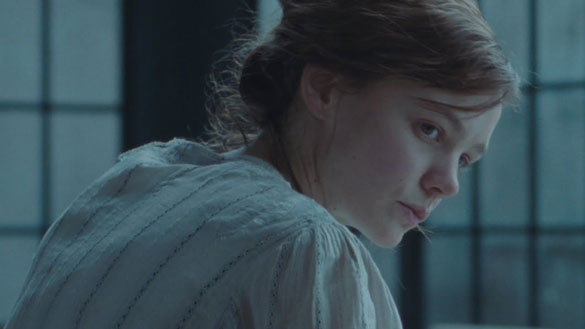LFF 2015: Suffragette ****
As a female and a mother, the most sobering part of this film is at the very end. A list of nations rolls with the dates women got the vote. Some dates will profoundly shock. Others will not. Some women are still waiting. It’s the grand finale needed to drive the message home in a film that does not – and cannot – give you a happy ending. Too much was at stake and an awful lot lost.
Set in 1912-1913 at the height of the Suffragette movement, Suffragette follows the story of working-class Maud Watts (Carey Mulligan), living with her husband (Ben Whishaw) and young son in London’s Bethnal Green, East End. Maud has worked long hours in a local laundry since she was a little girl, run by leering boss Mr Taylor (Geoff Bell) who uses every opportunity to abuse certain ‘favourites’ of his female staff.
One co-worker, Violet (Anne-Marie Duff) has had enough and been secretly attending Suffragette meetings, held by local chemist Edith Ellyn (Helena Bonham Carter). When a battered Violet is unable to speak before ministers to put forward her case for women’s suffrage, Maud is persuaded to step in. Something changes at that moment as Maud realises the importance of what these women stand for. However, joining the campaign will mean ostracism and heartache for her, and her way of life drastically altered forever.
Director Sarah Gavron and screenwriter Abi Morgan’s drama is designed to be highly emotive and empowering. It’s hard not to get behind Maud on such an important issue – and it’s not necessarily about getting the vote, but liberating fifty per cent of the UK’s population at the time.
Even though none of the fight is pictured in a particularly favourable light, it’s not meant to be – except, perhaps, the romanticised and very brief outing of Meryl Streep as Emmeline Pankhurst on a balcony then dashing into a waiting carriage while telling women everywhere to stand true and never give up. Gavron uses uncompromising shots to show the true brutality of the suffragettes verses authority. It may well be a period drama but it’s gritty like newsreel and quite unforgiving. It also highlights the stark reality of what happened if you got caught, with unpleasant reconstructions of prison suffering and torture.
In this respect, Mulligan’s weary, urchin-looking demeanour is perfectly cast and most harrowing when she losses that which is most dear to her. This point in the film – after following the escalation of previous sacrifices – will totally appal any parent at the tragic consequences reached when a mother and a wife is trying to bring about a better life, but not necessarily with the support of those closest to her.
The female cast is stellar and a draw in itself, but there is no posturing for screen time. In fact, the likes of Bonham Carter, for example, is very understated here. Romola Garai as middle-class Alice Haughton, a politician’s wife is equally downcast. Duff encapsulates all the physical scars of a suffragette of the time, including the emotional toll. Surrounding their characters is a greater menace of public shame and humiliation that puts a further gloom over the picture. However, it’s still Mulligan’s triumph as Maud as she grows from a wretched shell to a promising leader and independent.
Suffragette is a film on a mission to educate, and does so in an unambiguous fashion. It is deeply effecting and relevant with great performances that challenge perceptions. It may well beg for awards nods, but it is nevertheless a film that needed to be made – and even more significant is that it was by a female crew too.
4/5 stars
By @FilmGazer
